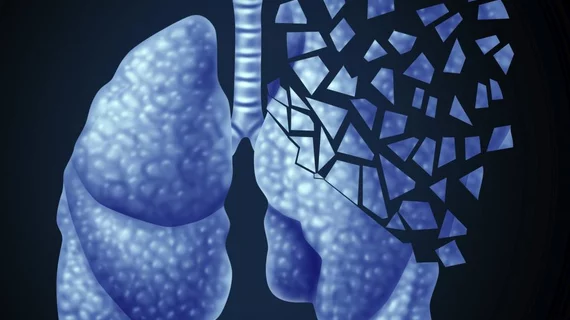PET/CT insights predict immunotherapy response in patients with advanced lung cancer
Molecular imaging can non-invasively measure a biomarker of lung cancer and predict if a patient may respond to therapy, according to evidence published Wednesday.
Researchers with the renowned Moffitt Cancer Center determined features within PET/CT scans can be used to measure the expression of PD-L1 levels in people with non-small cell lung cancer (NSCLC). Achieving this typically requires testing samples gathered via invasive biopsy, experts explained in the Journal of ImmunoTherapy of Cancer.
Chair of the Department of Cancer Physiology at Tampa, Florida-based Moffitt, Robert Gillies, PhD, had high praise for the findings.
"This study is important, as it is the single largest multi-institutional radiomic study population of NSCLC patients to-date treated with immunotherapy to predict PD-L1 status and subsequent treatment response using PET/CT scans," Gillies added Thursday. "Because images are routinely obtained and are not subject to sampling bias per se, we propose that the individualized risk assessment information provided by these analyses may be useful as a future clinical decision support tool pending larger prospective trials."
Checkpoint inhibitors target the PD-L1/PD1 signaling pathway and are commonly used to treat those with NSCLC. While this therapy can be highly effective, it only works for nearly 50% of patients.
In order to avoid treating those who likely won’t respond, checkpoint inhibitors are limited to those whose biopsy sample specifically shows the PD-L1 biomarker. Alternative strategies, such as this imaging-based approach, carry less risk than surgery and may increase the pool of patients eligible for treatment.
Gillies and co-authors confirmed their findings using PET/CT exams and clinical data taken from nearly 700 patients with NSCLC across three healthcare institutions. Image features such as shape, size, pixel intensity and textures were used to teach a deep learning tool to measure PD-L1 expression.
And corresponding deep learning scores did just that. Following validation in many different patient groups, the authors used it to accurately predict checkpoint inhibitor outcomes.
"These data demonstrate the feasibility of using an alternative non-invasive approach to predict expression of PD-L1," Matthew Schabath, PhD, associate member of the Cancer Epidemiology Department at Moffit said. "This approach could help physicians determine optimal treatment strategies for their patients, especially when tissue samples are not available or when common testing approaches for PD-L1 fail."

